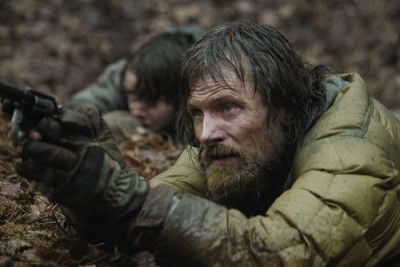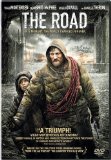| Reviews & Columns |
|
Reviews DVD TV on DVD Blu-ray 4K UHD International DVDs In Theaters Reviews by Studio Video Games Features Collector Series DVDs Easter Egg Database Interviews DVD Talk Radio Feature Articles Columns Anime Talk DVD Savant Horror DVDs The M.O.D. Squad Art House HD Talk Silent DVD
|
DVD Talk Forum |
|
|
| Resources |
|
DVD Price Search Customer Service #'s RCE Info Links |
|
Columns
|
|
|
Road, The

John Hillcoat and Joe Penhall's film adaptation of Cormac McCarthy's Pulitzer Prize-winning novel visualizes all of the bleakness of the original book and captures some of the emotional impact. But it lacks that central special ingredient that made the novel so important and so memorable: McCarthy's language. This is an instance of a faithfully-adapted film unconsciously slitting its own throat vis-à-vis the limitations of its medium.
A vaguely-described holocaust has left the world enveloped in what appears to be an ash-glutted nuclear winter. A man (Viggo Mortensen) and his son (Kodi Smit-McPhee) are among a very small number of human beings left roaming the earth, desperate for food, shelter, and warmth. Each day comprises a new set of life-threatening challenges, and each night is filled with black dread. Other survivors tend to be murderous cannibals, shown hunting down victims like crazed zombies.
The Road has a minimal plot. The book can be read in a sitting, and frankly, there just isn't enough there to justify a two-hour film. (A 90-minute version of The Road would have been far more compelling.) But the issue of length pales when measured against the issue of voice. Cormac McCarthy is a unique stylist, and his narrative voice is a large part of what makes his books work so well. Knowing this, filmmakers working from a book may choose to emphasize some aspect of the story that does not depend upon the power of language to convey its significance. By necessity, an adaptation must do something cinematic that a book cannot. In the case of The Road, the visualization of this post-apocalyptic world and its wasted landscape could serve as an illustrative "version" of the narrator's voice - showing us what the book must describe in words.
Yet director Hillcoat and screenwriter Penhall chose to do a fairly straight adaptation of the book - faithfully translating the plot, dialogue, and situations in a workman-like manner. The resulting film is not bad, but it is more of a companion piece to the book than a new version of the story that stands on its own and has its own strengths and merits. Because it attempts to capture the whole book, the film fails to successfully address any of it. The massive emotional momentum of the book and the heartbreaking ending feel oddly neutered here for reasons I can't quite pinpoint.
Although visually ambitious on the surface, The Road doesn't quite succeed in that department, either. Color has been leeched from the images, rendering them a dusty gray. But it's monochromatic to the point of blurriness. The low-contrast images hardly bear more than a single value - even less than the average black-and-white film. Had The Road been shot in black-and-white, images could have had greater contrast, shadow, and detail, while retaining the otherwise appropriate lack of color.
The performances are strong, but somehow fail to convince; even the great Viggo Mortensen seems to be struggling against an incomplete character. Since the film wishes to "do it all" in adapting the book, there is a lack of focus; characters feel a little diffuse in both the internal and external conflicts they face. The man wants the boy to survive - but why, exactly? There are a couple of scenes in which the boy reacts to the man's behavior toward others - and there is a suggestion that the man's need to keep the boy alive in a dying world has turned him into a quiet maniac, unable to cope with the rest of humanity. These scenes hint at a powerful idea: if we cannot behave humanely towards others, what good is living? Unfortunately, this is only touched on in the latter part of the film. It is yet another aspect of The Road that fails to achieve its goal.
The DVD
The Video
As I mentioned in the review above, the visual style of The Road is dull. It's flat, gray look leaves scenes looking like fuzzy etchings. The enhanced 2.35:1 transfer is a solid job, as far as it can go. The transfer captures whatever detail is available with strong fidelity, although some of the darker scenes bear traces of digital break-up.
The Audio
The Dolby Digital 5.1 surround track is good, but not excellent. A good sound environment has been created, and the mix may have worked theatrically. But the DVD sounds muffled. The front channels are okay, but directional effects are not well-separated, and there's an overriding tinny sound to the track.
The Extras
First up is a Commentary Track with director John Hillcoat, which is possibly more engaging than the film itself. There is a lot of production detail here, as well as a discussion of how the story was shaped for the film. A group of Deleted Scenes and a short Making of the Road featurette don't add a whole lot to the experience.
Final Thoughts
Although valiant and thoughtful in fits and starts, The Road doesn't quite work. Unlike its source novel, the movie is capable, but forgettable. The bleak tone will get you down, but the visuals are gray to the point of blandness. For those who have read the novel, the film will be an interesting tangent, while other viewers may find the film too monotonously depressing to be of interest. Rent it.
|
| Popular Reviews |
| Sponsored Links |
|
|
| Sponsored Links |
|
|
| Release List | Reviews | Shop | Newsletter | Forum | DVD Giveaways | Blu-Ray | Advertise |
|
Copyright 2024 DVDTalk.com All Rights Reserved. Legal Info, Privacy Policy, Terms of Use,
Manage Preferences,
Your Privacy Choices | |||||||














